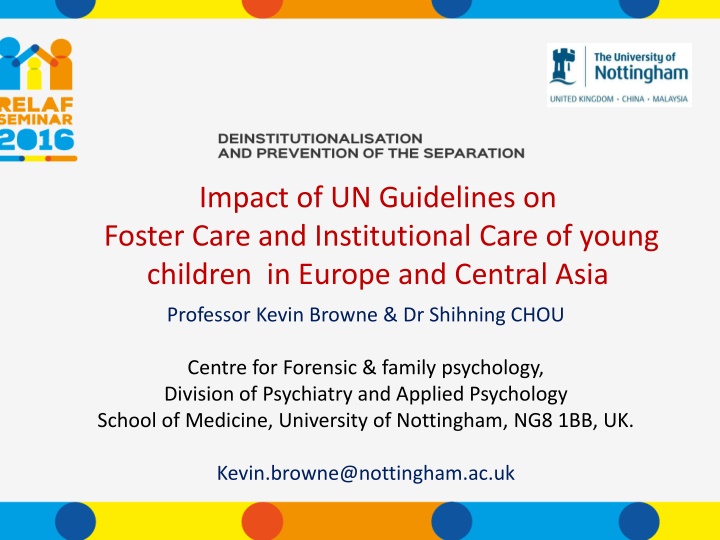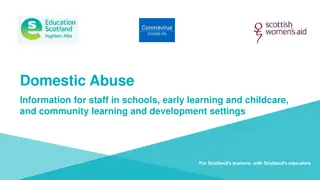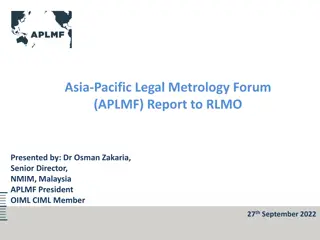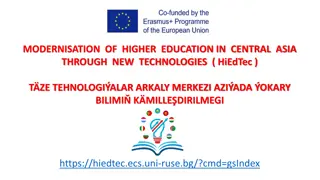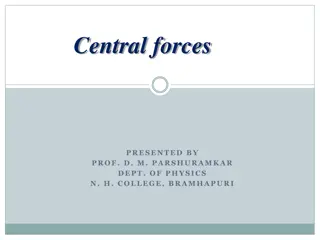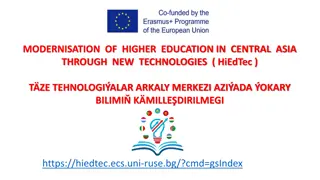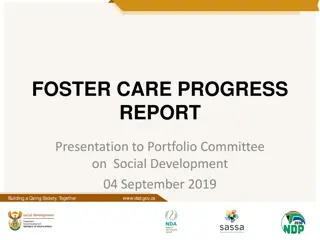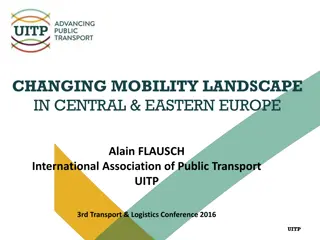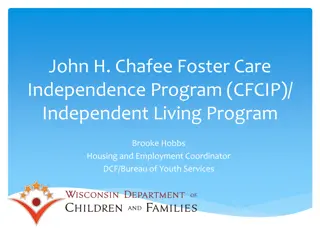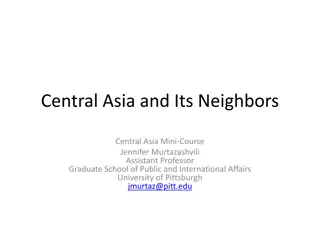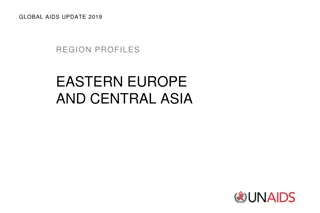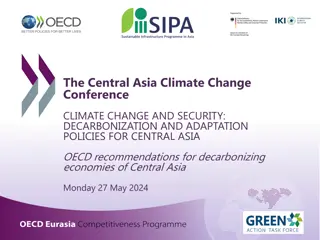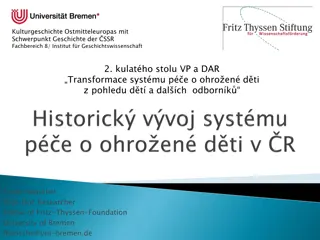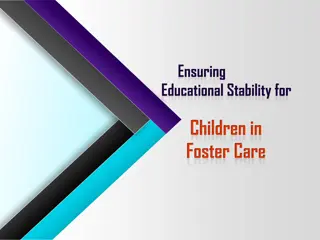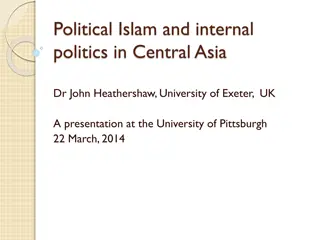Impact of UN Guidelines on Foster Care and Institutional Care of Young Children in Europe and Central Asia
Professor Kevin Browne and Dr. Shihning Chou conducted a study on the impact of UN guidelines on foster care and institutional care of young children in Europe and Central Asia. The research highlights the physical harm and neural damage caused to children in institutional care without a parent. It also reveals concerning statistics on children under 3 years in residential care across various countries.
Download Presentation

Please find below an Image/Link to download the presentation.
The content on the website is provided AS IS for your information and personal use only. It may not be sold, licensed, or shared on other websites without obtaining consent from the author.If you encounter any issues during the download, it is possible that the publisher has removed the file from their server.
You are allowed to download the files provided on this website for personal or commercial use, subject to the condition that they are used lawfully. All files are the property of their respective owners.
The content on the website is provided AS IS for your information and personal use only. It may not be sold, licensed, or shared on other websites without obtaining consent from the author.
E N D
Presentation Transcript
Impact of UN Guidelines on Foster Care and Institutional Care of young children in Europe and Central Asia Professor Kevin Browne & Dr Shihning CHOU Centre for Forensic & family psychology, Division of Psychiatry and Applied Psychology School of Medicine, University of Nottingham, NG8 1BB, UK. Kevin.browne@nottingham.ac.uk
Institutional care without a parent causes physical harm and neural damage to all young children.
Infants my be imprisoned behind their cot bars for up to 18 hours a day
United Nations General Assembly Report of the Human Rights Council on its 11th Session (A/HRC/11/37, Section 11/7, p.23) Guidelines for the Alternative Care of Children (2010) Related Publications
Country with children under 3 In Residential Care - 2013 Proporti on per 10,000 Change since 2003 per 10,000 Country with children under 3 In Residential Care - 2013 Proporti on per 10,000 Change 2003 per 10,000 Bosnia & Herz* 9 +2 Sweden* 7 -1 Latvia 54 -1 Germany 6 -1 Lithuania 45 -1 Montenegro 6 -5 Bulgaria 43 -7 Turkmenistan* 5 -1 Czech Republic 38 -22 Italy* 5 -3 Malta 32 +5 Netherlands 5 -11 Belarus 27 -18 Kyrgyzstan* 4 -2 Belgium* 26 -30 Tajikistan* 4 +2 Russia* 24 -15 Georgia 3 -1 Moldova 16 +4 Kosova 3 No Info. Albania* 15 +7 Serbia* 2 0 Kazakhstan* 15 -1 Turkey 2 0 Romania 14 -20 Spain* 2 -21 FYR Macedonia 14 -1 Uzbekistan* 2 -1 Hungary 12 -32 Azerbaijan 1 -4 Slovak Republic* 10 -21 Denmark 1 -6 Estonia 10 -16 Norway <1 <1 Croatia 10 +2 Ireland 0 -6 Poland 10 +1 Cyprus 0 -4 Austria 10 +7 UK 0 -1 Armenia 10 No info. Slovenia 0 0 Finland 9 -19 Iceland 0 0
Young Children under 3 years in Care 2013: % residential care, % foster care and total number Percentage (%) in institutions Percentage (%) in foster care 120.0 1,568 110.0 6,850 597 9,288 2 20 11 40 1,800 1,213 162 167 154 443 100.0 510 1,190 1,921 285 3,423 622 429 104 1,925 7,4072,370 90.0 1,966 180 6,071 3,925 1,228 19 80.0 945 657 195 938 70.0 130 1366 485 85 1,450 28099 29,683 60.0 754 1,986 2,581 50.0 40.0 30.0 20.0 10.0 0.0 Latvia Lithuania Romania Iceland Serbia Belarus Bulgaria Sweden Cyprus Austria Poland Moldova Hungary Finland Italy Turkey Albania Estonia Belgium FYRO Macedonia Montenegro Armenia Turkmenistan Tajikistan Czech Republic Slovak Republic Bosnia & Herzegovina Malta Denmark UK Spain Uzbekistan Ukraine Georgia Kazakhstan Monaco Germany Netherlands Ireland Slovenia Kosovo Russian Federation Croatia Norway Azerbaijan Kyrgyzstan
SOCIAL REASONS FOR RESIDENTIAL CARE Lack of community nurses and social workers Lack of home based assessments of children in need and their families Lack of free universal prevention services to reduce child abuse, neglect and abandonment (eg; positive parenting & counselling programs and community mental health and addiction services) Weak targeted interventions with families high risk of child abuse, neglect and abandonment. Slow development of therapeutic foster care. The health sector must be involved to prevent separation and sustain reunification of children with their parent(s)
Manual on the Better Care Network: Mulheir, G., Browne, K. and Associates (2007). De-Institutionalising And Transforming Children s Services: A Guide To Good Practice. From Kevin.browne@nottingham.ac.uk OR www.crin.org/bcn
Mother-Baby Units to replace Baby Homes No child under three in residential care without a parent
Further Reading Browne, K.D., Hamilton-Giachritis, C.E., Johnson, R. and Ostergren, M. (2006). Overuse of institutional care for children in Europe. British Medical Journal. 332 : 485-487 (25/02/06). Chou, S. and Browne, K.D. (2008). The Relationship between Institutional Care and International Adoption of Children in European. Adoption & Fostering, 32(1): 40-48. Browne, K.D. and Chou, S. (2008). Child Rights and International Adoption: A Response to Critics. Adoption & Fostering, 32(2): 69-74. Chou, S. and Browne, K.D. (2015). The relationship over time between international adoption and institutional care in Romania and Lithuania. Child Abuse Review. DOI: 10.1002/car.2395 (in press) Browne, K. (2009) The risk of harm to young children in institutional care. London: Save the Children/UNICEF Better Care Network. UNICEF (2010) Ending placing children under three years in institutions: A call to action. NY;Unicef Hamilton-Giachritsis,C and Browne, K.D. (2012)Forgotten children? An update on young children in institutions across Europe, Early Human Development 88: 911-914. Browne, K.D, Chou, S. Whitfield, K. and associates (2012). Child Abandonment and its Prevention in Europe. Sociologie Si Asistenta Sociala. 5 (2); p197-204. Iasi, Romania.
